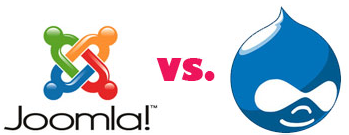Joomla or Drupal, how to choose the right CMS

Trying to evaluate the most popular Content Management Systems, Joomla and Drupal, we can find great advantages using these systems.
Drupal users feel that their modules integrate better with Drupal core, and the framework is easy to extend. Drupal users rated higher than Joomla users for multimedia support, document management, SSL, and blogging. With Drupal is easy to build complex websites.
Joomla is easier; Drupal is not an absolute winner. The ability for users to learn Joomla CMS interface, upgrading and interface are great advantages of Joomla. The possibility to create a new site quickly, to add new modules and components, the chance to teach clients to use Joomla to update the content are also important advantages.
The most common complaint about Drupal is that is has no editor; Joomla comes with TinyMCE by default. Drupal is not offering many templates; the choices are really poor. The huge choice of templates is Joomla biggest strength. There are many commercial and free templates.
Community features: Drupal offers the possibility to expand users’ profiles, giving a powerful community-building function. Drupal is an excellent CMS for those who are looking for community building content management systems. Very high profile organizations are using Drupal. The flexibility of categorizing the content is great, as well as being able to tune the permissions for every role.
Community features not exist by default in Joomla, but it is possible to use two very powerful extensions. Joomsocial is commercial, but worth the money, being a powerful social application. Community Builder is a high quality extension.
Shopping cart: this is not Drupal strong part. Users have only one option: Ubercart, but this is a high quality ecommerce platform. Maybe a version for small store will be welcome. Joomla have a major shopping cart, named Virtuemart. Some are considering it buggy and hard to handle.
Forums: Drupal has a native forum, very smooth, but with no modern features, like the newest forums. Joomla gives the choice between Agora and Kunena and JFusion.
Drupal is installed in fewer steps than Joomla. Joomla instead never asks for changes of names in files configuration or a database creation. A full Drupal installation seems very Spartan (both in form and content) compared with Joomla, which already has a very rich content and display it since the first access.
Joomla is excellent for every kind of site. The blogging feature can be improved. Joomla has a huge user base when the sites must be nicely customized, with awesome templates, professional look and feel. Joomla modules are correctly coded and integrated with the core of the system. Some modules or component must be purchased, but the prices are affordable and the customer support is great in almost all cases.
BlueHost | HostGator | Media Temple

